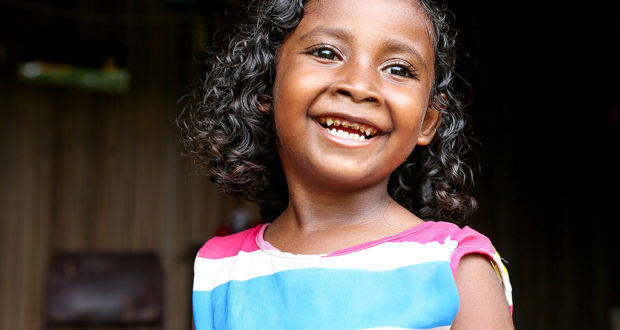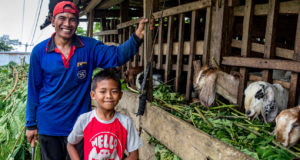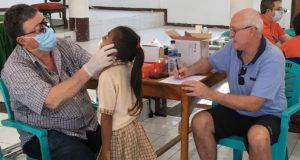Our standard vision of poverty is often restricted to images of people lacking all the necessities but as Cath Taylor discovered in West Timor, our preconceptions can get in the way of facilitating change.
The moment I spot the mobile phone I flash an eyebrow at our photographer. It says, “Uh-oh, can we get that out of there? If not physically, then at least out of the shot? I totally forgot about mobile phones …”
Because here’s the thing: “poor people” don’t have mobile phones. And since we’re in West Timor shooting footage and film to encourage people to get behind projects that support said “poor people”, the presence of this contradictory, offensive mobile phone means we’re in trouble.
Most people in West Timor live on less than $2 per day. Yet in spite of their significant poverty, many of them have mobiles, and this is true of people in most developing (and developed) countries.
More than half of India’s sprawling population own phones, more in fact than own toilets. In the United States, growing and grinding poverty is a massive problem, but people will go without food before they give up their phones.
Okay then, goes the logic, these people can’t need our help too badly.
Making connections
This is where our understanding of poverty shows up in all its frailty. It takes relatively little to own and maintain a resource like a mobile phone—you outlay the cost, pay a bill.
But the impact is immediate and ongoing, from life-giving relationships to staying safe, having access to vital information and being able to bank or trade easily. On the other hand, changing major structures like access to electricity, education and employment takes time and major investment.
In West Timor, I watched a man with virtually no sight, who works as a masseur, use his mobile to line up clients in Kupang. The mobile was voice-activated; he couldn’t even see the screen.
Thanks to a low-interest loan that helped build up his business, he earns around $5 per day which has completely changed his life, but he still draws his water from a well next to the house. It’s often pretty dirty.
Not poor enough yet?
There’s no doubt that the poorer, more desperate we think people are, the better we feel about giving to them. But does this make sense?
It’s as though people are not really “poor” or “desperate” enough in this world to warrant our attention or generosity until they’re actually dead, or near enough. And yet, if we invested just a layer above—at those who own the mobile phones and are starting to make their way in the world, no matter how difficult it might be—we could save hundreds of thousands of lives and millions of dollars.
In fact, one dollar invested before a disaster can save 15 after tragedy strikes. That’s because it’s far cheaper to help protect people from the crushing poverty that makes them vulnerable to disaster, war and disease than it is to help them recover afterwards. Proper investment in the lives of people in South Sudan, Nigeria, Ethiopia and throughout the Horn of Africa three years ago could have prevented what’s now being described as the greatest food threat since 1945.
Wise investment
Right now, UnitingWorld is eligible for special funding that recognises our development expertise and the generosity of our donors. For every $5 we can access, we must raise at least $1 in supporter donations.
In effect, this means gifts from Uniting Church people are six times more useful to us in the field, combined with Australian Aid funding.
Through a partnership with UnitingWorld and the local church in West Timor, 135 000 families have already been assisted using small loans to build lives for themselves that are meaningful and dignified.
Don’t get me wrong: by anyone’s standards, they’re still poor. But investing in these communities is about looking ahead and creating a whole society of people more likely to resist disease, conflict, radicalisation and the impact of changing climate, including devastation from natural disaster. That’s an impressive return by anyone’s standards.
For more information call 1800 998 122 or visit unitingworld.org.au/freedom
40 years creating big change
UnitingWorld is the Uniting Church in Australia’s agency working with people in Asia, Africa and the Pacific as they build lives free of poverty and share the good news of Christ. After 40 years we’ve evolved into a network that reflects the ongoing commitment of the Uniting Church to serve alongside our partner churches.
Here’s why we stand out:
- UnitingWorld does not just give physical aid to people. While the Uniting Church originally worked overseas through two separate organisations doing quite distinct work—Uniting Church Overseas Aid (UCOA) and Uniting International Mission—UnitingWorld has developed two units within the one agency to carry out our aid and Christian leadership work. That’s pretty unique among Christian NGOs! We work this way because it reflects the life of Jesus and our own local churches here in Australia. We care for whole people: body, mind and spirit.
- UnitingWorld doesn’t believe in charity. We believe in solidarity. We know the people we work with have genuine strengths and we stand alongside people building on those strengths long term. This means there’s no expectation of a “hand out” and everyone we work with is striving to make the most of their opportunities. This is the mindset that truly yields big change!
- We believe we have as much to learn as we have to give. Over the years the connections between Uniting Church people within Australia and those among our partners overseas have been deep and long lasting. Teachers, ministers, plumbers, librarians, musicians, accountants, families; they’ve all made their home among communities in Vanuatu, India, Zimbabwe, Korea and Mongolia, sharing life and faith together. We’ve learnt from one another, living out our calling to be Christ’s global church.
- We tackle the hard issues. Working with our ecumenical church partners, we’re helping people better understand the scriptures to take on big issues like gender equality, grapple with climate change and train Christian leaders for the emerging world. This is not easy work to fund or to manage, but we persevere because it’s life changing.
 JourneyOnline
JourneyOnline







